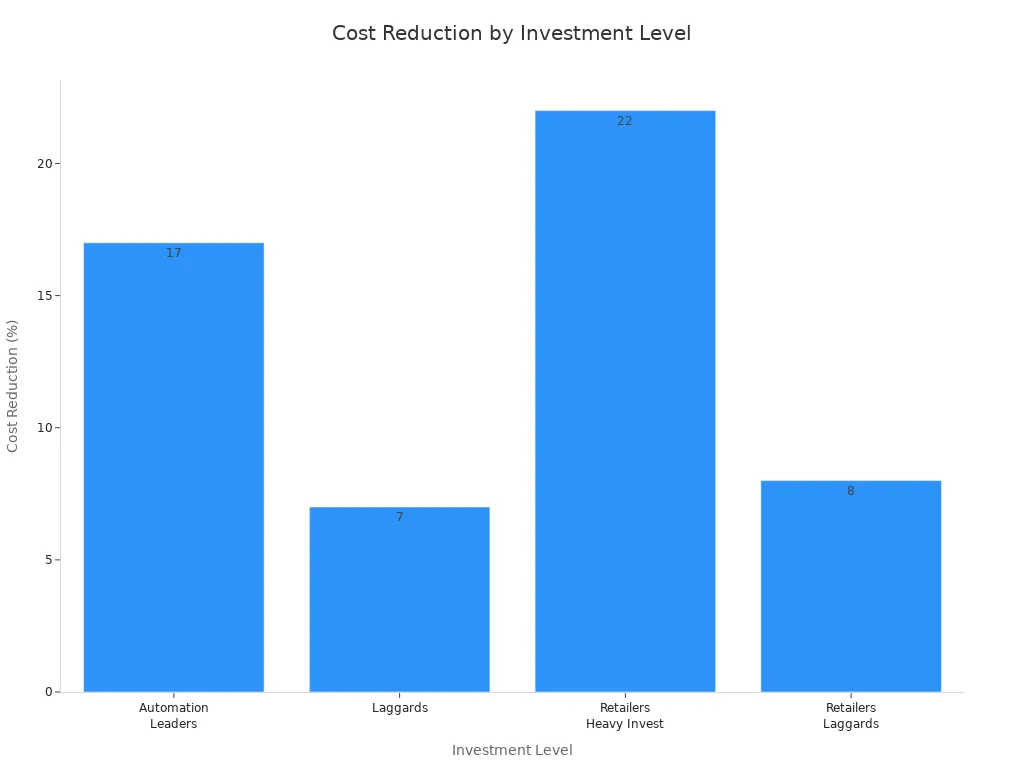How to Evaluate AI Tech Companies to Invest in for Store Automation

When you evaluate AI tech companies for store automation, focus on real impact and proven value. Most digital transformation projects don’t reach their goals, and almost three out of four automation efforts fall short on ROI. Did you know nearly 90% of retailers already use or test AI? The difference comes down to smart choices. Check out this chart—retailers who invest more in automation see much higher cost savings:

Think about your store’s needs as you move forward.
Key Takeaways
Identify your store's specific needs before investing in AI. Focus on pain points like inventory management or customer service to set clear goals.
Define key performance indicators (KPIs) to measure the success of your automation efforts. Track metrics like ROI and employee productivity to ensure your investment pays off.
Evaluate AI tech companies based on their market position and financial health. Choose partners with a strong track record and solid support to ensure long-term success.
Ensure the technology fits your store's operations. Ask about integration with existing systems and the reliability of the AI solutions offered.
Request demos and use checklists to validate your choices. Hands-on experience and structured evaluations help you make informed decisions.
Set Goals

Identify Needs
Before you dive into automation, you need to know what you want to fix or improve. Every store faces different challenges. Some stores struggle with keeping shelves stocked. Others want to speed up checkout or make customer service better. Start by listing your biggest pain points. Here are some common goals retailers set when they invest in AI technology for store automation:
Real-time inventory management to solve supply chain problems
Automation of routine tasks to boost efficiency
Improving customer service for a better shopping experience
Targeting out-of-stocks and reducing missed sales
Ensuring pricing accuracy and planogram compliance
Using AI chatbots or virtual assistants to help customers quickly
You might also want to keep up with competitors. Many retailers now use AI for core operations. If you want to stay ahead, you need to focus on areas that matter most to your business.
You can look at what other retailers are doing around the world. For example, 40% of stores in the U.S. and Brazil make hyper-personalized experiences a top priority. In India, 96% of retailers invest in AI for automation. Most stores aim to become mostly automated, and those that do often feel more confident about their data quality.
Define KPIs
Once you know your goals, you need to measure your progress. Key performance indicators (KPIs) help you see if your automation project works. Here are some KPIs you can track:
KPI | What It Measures | Why It Matters |
|---|---|---|
Time saved by automation | Reduces bottlenecks | |
Error Rate Reduction | Fewer mistakes after automation | Improves data quality |
Real-time Reporting Speed | Faster report generation | Helps you make quick decisions |
Employee Productivity | More tasks completed by staff | Lets employees focus on important work |
ROI | Savings vs. software costs | Shows if your investment pays off |
System Uptime | Hours system stays running | Keeps your store running smoothly |
User Adoption Rate | How many people use the new system | High rates mean the tool is useful |
When you evaluate AI Tech Companies, check if their solutions help you reach these KPIs. This step makes sure you pick the right partner for your store’s needs.
Evaluate AI Tech Companies
Choosing the right partner for store automation can feel overwhelming. You want to make sure you pick a company that stands out in the market, has strong financial health, and offers technology that fits your needs. Let’s break down how you can evaluate AI tech companies with confidence.
Market Position
Start by looking at where a company stands in the industry. Companies with a strong market position often have more resources, better support, and proven solutions. You want to work with a leader, not a follower. Here are some of the top players in store automation right now:
Honeywell International Inc.
NCR VOYIX Corporation
Diebold Nixdorf, Incorporated
Zebra Technologies Corp.
Toshiba Global Commerce Solutions
Fujitsu Limited
IBM Corporation
Panasonic Corporation
ECR Software Corporation
Posiflex Technology Inc.
NEC Corporation
Pricer AB
Zucchetti Group
Seiko Epson Corporation
Datalogic S.p.A.
SAP SE
These companies have built a reputation for delivering results. When you evaluate AI tech companies, check if they have a track record of successful projects and happy customers. Leaders in the market often invest more in research and development, so their solutions stay ahead of the curve.
Tip: Ask for case studies or references from other retailers. This helps you see how the company performs in real-world situations.
Financial Health
You want a partner who will be around for the long haul. A company’s financial health tells you if they can support your store now and in the future. Look for companies with steady growth, strong revenue, and a good balance sheet. Public companies often share this information in annual reports. For private companies, you can ask for financial statements or look for third-party ratings.
A stable company can invest in new features, offer better support, and weather tough times. If a company struggles financially, you might face risks like poor service or sudden changes in direction. When you evaluate AI tech companies, always check their financial background before making a commitment.
Technology Fit
Not every AI solution will work for your store. You need to make sure the technology matches your goals and fits into your daily operations. Here’s a simple table to help you compare different options:
Criteria | Description |
|---|---|
Functional requirements | Does the AI software meet your store’s needs? |
Problem fit | Can the AI solve your specific challenges? |
Accuracy | Are the results reliable and consistent? |
Non-functional requirements | Is the solution secure, easy to use, and scalable? |
Vendor criteria | Does the company offer strong support and customization? |
Costs | Are the licensing, setup, and running costs reasonable? |
When you evaluate AI tech companies, ask about how their technology works in real stores. Some companies use generative AI to automate tasks like employee scheduling, customer questions, and inventory management. This type of AI can handle up to 60% of routine work, so your team can focus on bigger goals. Generative AI also helps you make faster decisions and gives your managers more time for strategy.
Retailers now use AI to personalize shopping, predict demand, and set better prices. Companies that lead in this space often use AI for a competitive edge and to automate more of the value chain. As you evaluate AI tech companies, look for those who use the latest tools to help you stay ahead.
Note: Many retail executives believe that over 41% of their workforce will need new skills because of AI and automation. Almost half invest in training their teams instead of hiring new staff. Make sure your partner can support you as your needs change.
If you follow these steps, you can evaluate AI tech companies with a clear plan. You’ll find a partner who fits your goals, supports your growth, and helps you get the most from store automation.
Security and Integration

Data Security
You want your store’s data to stay safe. AI automation can make things easier, but it also brings new risks. Take a look at some common problems you might face:
Risk Type | Description |
|---|---|
Exposing code to the internet | Leaving AI code online can lead to theft or misuse. |
Sensitive data in AI models | Storing private info in the cloud can cause leaks during AI tasks. |
Data leakage and tampering | Hackers might steal or change your data, hurting your AI’s accuracy. |
Lack of Access Controls | Weak security can let the wrong people see important data. |
You need to pick a partner who takes privacy and compliance seriously. Leading AI tech companies use smart automation to find and protect data across all their systems. They make privacy rules easy to follow and keep records for audits. This helps you build trust with your customers and keeps your store out of trouble.
Tip: Ask vendors how they automate privacy checks and handle sensitive information. The best ones turn privacy into a strength, not just a checkbox.
System Integration
Getting AI to work with your current store systems can be tricky. You might run into problems like managing lots of data, training your team, or dealing with old software. Here are some challenges you could face:
Challenge Type | Description |
|---|---|
Data Management Complexities | Controlling who can see and use data is tough, especially with private info. |
Workforce Readiness | Your team may need new skills to use AI tools. |
Ethical and Privacy Concerns | You must protect customer privacy and avoid bias in AI decisions. |
High Initial Investment | Buying new tech and training staff can cost a lot. |
Difficulties in Scaling AI Initiatives | Expanding AI across all stores is hard if your systems don’t match up. |
The good news? Top AI companies make integration easier. Scale Computing’s Edge AI lets you process data in real time and keeps things secure. Intel’s AI Edge Systems help you connect new AI tools with your old systems. CGI’s solutions blend your current network with modern platforms, so you get better results without starting from scratch.
Note: Always check if the AI solution works with your store’s existing hardware and software. Smooth integration saves you time and money.
Reputation and Support
Track Record
You want to know if an AI tech company can deliver real results. A strong track record shows you that a company has helped other stores succeed. When you look at past projects, you see what’s possible for your own business. Here are some real examples of what stores have achieved with the right AI partner:
Regional Retailer Inc. cut inventory costs by 40% in just six months after using AI systems.
They also saw a 25% drop in stockouts and a 30% decrease in overstocking.
Walmart used the FAST Unloader system and boosted worker productivity by 25%. Customers got better service, too.
The same system reduced unloading time by 30% and cut inventory errors by 90%.
These numbers show you that the right AI solution can make a big difference. When you talk to vendors, ask for stories like these. You want proof that their technology works in real stores.
Customer Support
Great support helps you get the most from your AI investment. You need a partner who answers questions fast and solves problems before they grow. Leading AI tech companies offer many types of support to keep your store running smoothly.
AI Technology | Functionality | Benefits |
|---|---|---|
Chatbots | Handle simple questions and FAQs | Free up staff for tougher problems |
Natural Language Processing (NLP) | Understand and reply in a human-like way | Make customer chats feel friendly and easy |
Machine Learning (ML) | Guess what you need and offer help before you ask | Give you a personal touch and faster solutions |
Predictive Analytics | Study your habits and predict future needs | Help you stay ahead and fix issues early |
You also get tools like automated ticketing from Helpshift, real-time voice agents from CloudTalk, and smart chatbots from Zendesk. These tools make support quick and simple.
Let’s see how some top companies compare:
Company | AI Support Features | Response Time | Support Quality |
|---|---|---|---|
Order tracking, refunds, delivery help | Fast | High | |
Revolut | 24/7 help for account issues | Seconds | High |
Lufthansa | Booking changes, real-time updates | Quick | High |
Grammarly | Billing and subscription support | Efficient | High |
When you choose a partner with a strong track record and great support, you set your store up for success. 🚀
ROI and Scalability
When you look at store automation, you want to know if your investment will pay off. Let’s break down how to check the return on investment (ROI) and see if a solution can grow with your business.
Pricing Models
AI tech companies use different ways to charge for their solutions. You should understand these models before you make a choice. Here’s a quick table to help you compare:
Pricing Model | Description |
|---|---|
Value-based pricing | Sets price based on the value delivered to you and your ROI. |
Usage-based pricing | Charges you for what you use, like API calls or data processed. |
Subscription models | Offers monthly or yearly plans with different features or usage limits. |
Freemium models | Gives you a free basic version, but you pay for advanced features. |
License fee models | One-time or recurring fees for software access, often for big stores. |
Performance-based pricing | You pay based on the results or value the AI brings to your store. |
Hybrid pricing models | Mixes different models to fit your needs and budget. |
You also need to look at the total cost of ownership. For retail and e-commerce, you might spend $350,000 to $1,200,000 to get started, with yearly costs from $70,000 to $240,000. These numbers can change based on your store size and needs.
Projected ROI
To get the most from your investment, start by finding your biggest pain points. Don’t just buy technology—solve real problems. Work with your team and set clear goals. Use your current data to help AI work better and faster. Off-the-shelf AI tools can save you time and money.
Here are some ways to boost your ROI:
Focus on quick wins and automate simple, repetitive tasks first.
Use your existing data and systems to cut costs.
Track KPIs like revenue, delivery speed, and productivity to measure success.
Keep checking your results and adjust as you go.
Scalability matters, too. If your solution can grow with you, you’ll see more value over time. Startups often move fast and try new things, while big companies want stable, reliable systems. Most of the value comes when you scale up, so plan for growth from the start.
When you evaluate AI Tech Companies, always ask about long-term value and how their solutions can help you grow.
Validation Steps
Before you make a final decision, you need to see how an AI solution works in real life. You want to know if it fits your store, solves your problems, and delivers value. Here’s how you can validate your choices with confidence.
Request Demos
Demos give you a front-row seat to see what an AI tool can really do. Over half of buyers—about 54%—want to see how a product works right away. Automated demos let you try out features, ask questions, and spot any issues before you buy.
Demos are critical for any sales process. The better you can convince your prospect how your product can solve the problem, the higher chance you have of selling the product.
When you watch a demo, you get a hands-on feel for the system. You can test how easy it is to use, check if it fits your daily tasks, and see if it really solves your biggest pain points. Demos also help you compare different vendors side by side. If you spot any weaknesses, you can ask about fixes or support options.
Use Checklists
A checklist keeps you on track and helps you make smart choices. Here’s a simple step-by-step list you can use:
Define your needs clearly.
Match the AI tool to your business challenge.
Check for data security and compliance.
Assess ease of use and integration.
Review vendor reputation and support.
Understand pricing and ROI.
Run a pilot or request a demo.
You can also use a table to organize your validation process:
Step | Description |
|---|---|
1 | Update your procedures and documents to get ready for AI validation. |
2 | Look for ways to use AI to save time and reduce team size. |
3 | Build skills in your team to manage and govern AI tools. |
A structured approach like this lines up your goals, keeps your team focused, and boosts your chances of success. When you follow these steps, you make sure your investment in store automation pays off.
You now have a clear path to pick the best AI tech company for store automation. Use each step to lower risk and boost your store’s value. Ready to move forward? Gather your team and start a shortlist of vendors. Next, focus on IT upgrades, add smart IoT devices, review your contact center tools, and improve inventory processes. Set rules for using generative AI. Grab your checklist and use this process for every tech investment. 🚀
FAQ
How do I know if an AI solution fits my store?
Ask for a demo. Try the tool with your real data. Check if it solves your main problems. Make sure your team finds it easy to use. If it works well, you have a good fit.
What should I look for in vendor support?
Look for fast answers and helpful staff. Good vendors offer chat, phone, and email support. They also provide training and clear guides. You want help when you need it most.
Can I start small with AI automation?
Yes! Many companies let you start with one store or a single task. You can test results before you expand. This way, you lower risk and learn as you go.
How do I measure ROI from AI automation?
Track your key numbers. Watch for time saved, fewer mistakes, and higher sales. Use a simple table to compare costs and benefits:
Metric | Before AI | After AI |
|---|---|---|
Time Spent | 20 hours | 8 hours |
Errors | 15 | 3 |
Sales | $5,000 | $6,500 |
Is my store’s data safe with AI tech companies?
Always ask about security. Good companies protect your data with strong passwords, encryption, and regular checks. They follow privacy laws and keep your information safe from hackers.
See Also
The Future of Retail Lies in AI-Driven Stores
Essential Insights for Retailers on AI-Enhanced Corner Stores
Starting an AI-Driven Corner Store on a Budget
Modern Retail Benefits from AI-Enabled Combo Vending Machines
Transforming Online Store Management with AI E-Commerce Solutions
